Dry skin in cats can be a persistent issue that many pet owners face, impacting the overall well-being of their feline companions. Understanding the root causes behind this condition is essential for effective management and care.
From environmental factors to grooming practices, several reasons can lead to dry skin in cats. Exploring home remedies that can offer relief and improve the skin health of our beloved pets is a proactive step worth considering.
By addressing these underlying causes and implementing suitable solutions, cat owners can make a significant difference in enhancing their cats' comfort and quality of life.
Key Takeaways
- Dry skin in cats can be caused by factors like dry air, low humidity, grooming challenges, and nutritional deficiencies.
- Regular grooming, proper nutrition, and bathing practices with oatmeal-based shampoos can help improve dry skin in cats.
- Look for symptoms like itchiness, inflamed skin, and hair loss to identify underlying conditions causing dry skin in cats.
- Consult a vet for a proper diagnosis and treatment plan if your cat exhibits symptoms of dry skin related to underlying health issues.
Dry Air and Skin Dryness
How does dry air, particularly in winter or arid climates, contribute to skin dryness in cats?
Dry air lacks moisture, causing the skin to lose its natural oils and become dehydrated. This lack of humidity can lead to flakiness, itchiness, and overall discomfort for your feline companion.
In winter, indoor heating further exacerbates the issue by stripping the air of moisture. Cats, with their sensitive skin, are particularly susceptible to these environmental factors.
To combat this, consider using a humidifier in your home, providing ample water for hydration, and ensuring your cat's diet includes essential fatty acids. These simple adjustments can help alleviate dry skin and keep your cat comfortable and healthy.
Impact of Low Humidity
Low humidity can significantly affect the skin elasticity and resilience of cats, leading to potential dryness and discomfort. Cats' skin, much like humans, relies on a certain level of moisture to remain supple and healthy.
When the air lacks moisture, it can cause the skin to become dry and prone to irritation. This is particularly true for indoor cats who may already be exposed to drier conditions within homes.
To combat the effects of low humidity, ensuring proper hydration for your cat is essential. Providing ample water sources and even using a humidifier in the home can help maintain a more comfortable environment for your feline friend to thrive with healthier skin.
Grooming Challenges and Skin Issues
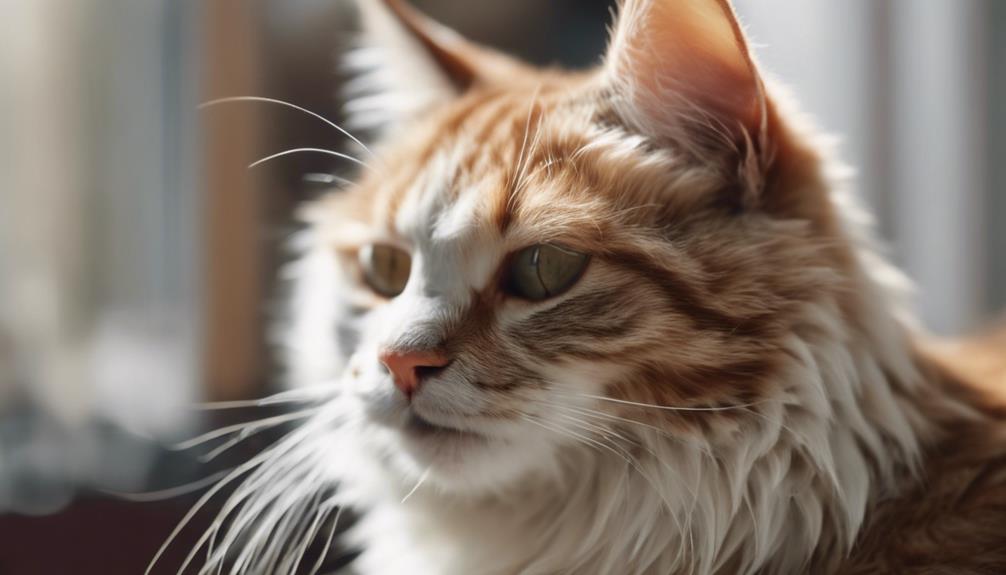
One common issue that can impact a cat's skin health is grooming challenges, which may arise due to various factors such as obesity and arthritis. These challenges can lead to dry skin and other skin issues, requiring special attention and care.
To address grooming challenges effectively:
- Regular brushing is essential for maintaining skin and coat health.
- Cats struggling with grooming due to obesity or arthritis may require assistance with grooming tasks.
- Occasional baths using oatmeal-based shampoos can help soothe dry skin and improve overall skin condition.
Nutritional Deficiencies and Dry Skin
To address nutritional deficiencies and their impact on a cat's skin health, understanding the essential role of proper diet is crucial. A cat's diet significantly influences the condition of its skin. Opt for cat foods with the right balance of nutrients, as indicated by the AAFCO Statement on labels. Diets rich in fats and proteins are beneficial for skin health.
Additionally, incorporating fatty acid supplements containing omega-3s and omega-6s can help improve the skin's condition. Ensuring your cat receives proper nutrition is vital in preventing dry skin issues. By providing a well-rounded diet tailored to your cat's specific needs, you can support their overall skin health and well-being.
Effects of Improper Bathing Practices
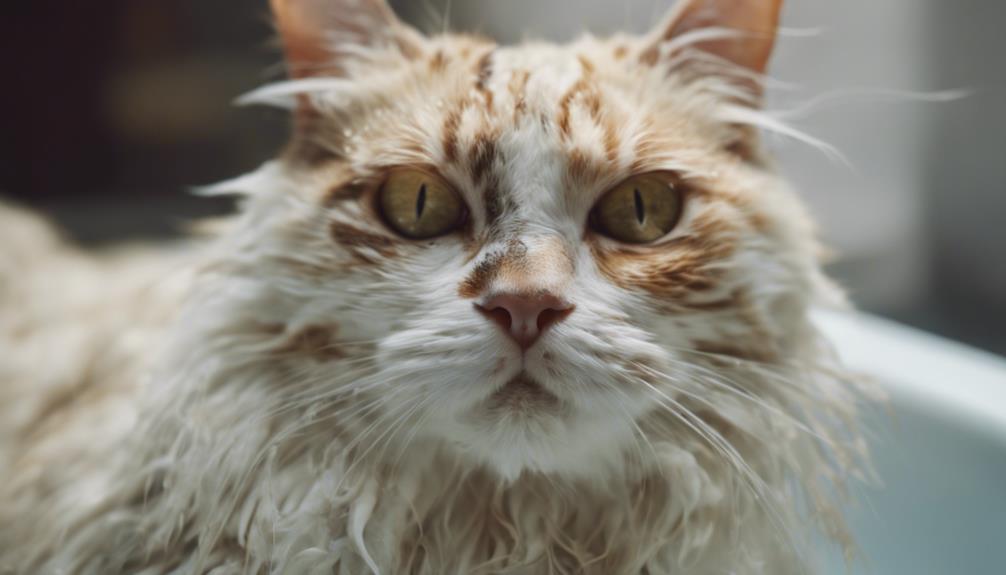
Improper bathing practices can exacerbate skin issues in cats, potentially leading to dryness and discomfort if not addressed properly. Cats have sensitive skin that can easily react to harsh bathing techniques or unsuitable products. To prevent worsening dry skin conditions, consider the following:
- Avoid frequent baths: Cats generally do not need frequent bathing as it can strip their skin of natural oils.
- Use gentle products: Opt for oatmeal-based shampoos designed for sensitive skin to prevent irritation.
- Proper water temperature: Use lukewarm water instead of hot water to avoid drying out the skin further.
Importance of Regular Grooming
Regular grooming plays a pivotal role in maintaining your cat's skin and coat health. It helps distribute natural oils, prevents matting, and removes dead hair and skin cells. Regular brushing stimulates blood flow to the skin, promoting a healthy coat.
Additionally, grooming sessions allow you to inspect your cat's skin for any abnormalities like dry patches, wounds, or parasites. For cats with dry skin, gentle grooming can help alleviate itching and discomfort. Developing a grooming routine creates a bonding opportunity with your feline friend and ensures their well-being.
Make grooming a relaxing and positive experience for your cat by using soft brushes and providing treats as rewards.
Assistance for Grooming Challenges
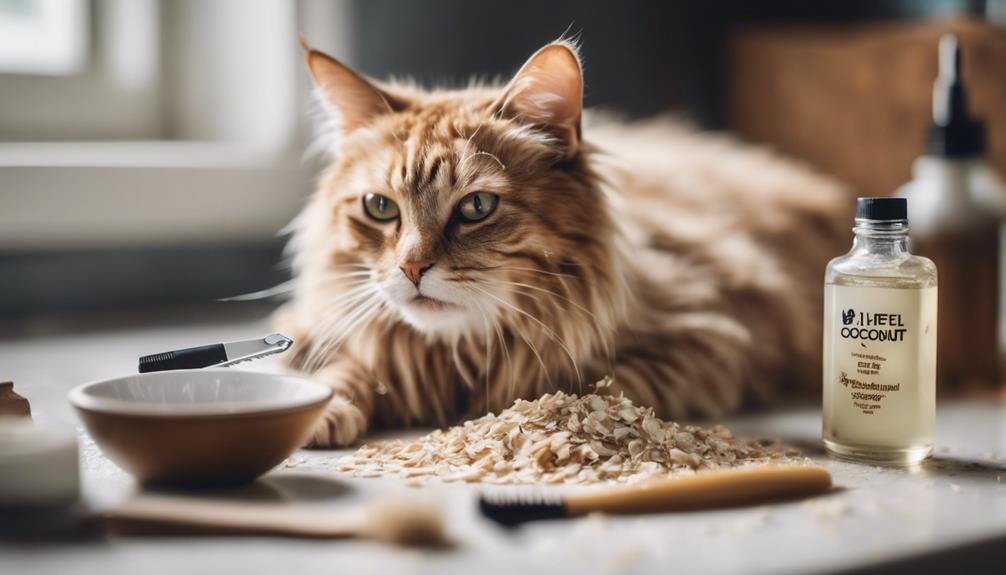
When faced with grooming challenges such as obesity or arthritis, cats may require assistance to maintain their skin and coat health effectively. In these situations, providing help with grooming tasks can significantly benefit your feline friend.
Here are some ways to offer assistance:
- Regular Brushing: Help your cat by gently brushing their coat to prevent matting and distribute natural oils.
- Gentle Bathing: Assist with occasional baths using oatmeal-based shampoos to soothe dry skin without stripping essential oils.
- Trimming Nails: Keep your cat's nails trimmed to prevent overgrowth and discomfort, especially if mobility issues are present.
Benefits of Brushing and Oatmeal Baths
When addressing grooming challenges like obesity or arthritis in cats, providing assistance in brushing and utilizing oatmeal baths can significantly contribute to maintaining their skin and coat health. Regular brushing helps distribute natural oils, preventing dry skin and matting.
Oatmeal baths are soothing and can alleviate itching and inflammation, promoting healthier skin. These grooming practices not only improve skin condition but also strengthen the bond between you and your feline friend.
Supportive Diet for Healthy Skin
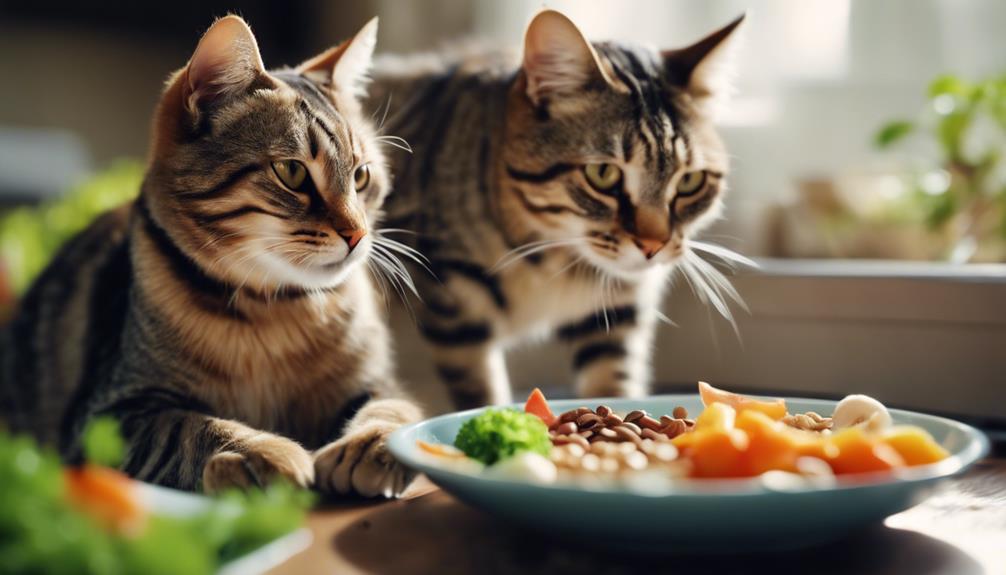
A well-balanced diet plays a crucial role in maintaining healthy skin for cats. Ensuring your feline friend receives the right nutrients can make a significant difference in their skin condition. Here are some key points to consider when supporting your cat's skin health through their diet:
- Nutrient-Rich Foods: Opt for cat foods high in essential fatty acids, such as omega-3s and omega-6s, to promote skin hydration and overall health.
- Protein-Packed Diet: Protein is essential for skin regeneration and repair, so make sure your cat's diet includes adequate amounts of high-quality protein sources.
- Supplements: Consider adding fatty acid supplements to your cat's diet to further enhance their skin condition and reduce dryness.
Checking Cat Food Labels
Inspecting cat food labels is essential for ensuring your feline companion receives the necessary nutrients for optimal skin health. By checking the AAFCO Statement on the label, you can ensure the food meets essential nutritional standards. Look for diets high in fat and protein, as these components support skin health. Additionally, consider fatty acid supplements containing omega-3s and omega-6s, known for improving skin condition. Here is a helpful breakdown to guide you in deciphering cat food labels:
| Nutrient | Importance | Sources in Cat Food |
|---|---|---|
| Protein | Essential for skin repair and maintenance | Meat, fish, poultry |
| Fats | Aid in skin hydration and overall skin health | Animal fat, fish oil |
| Vitamins | Support skin health and immune function | Vitamins A, E, and B complex |
| Minerals | Important for skin structure and function | Zinc, copper, selenium |
Make sure these elements are present in your cat's food for a healthy skin glow.
Fatty Acids for Skin Health
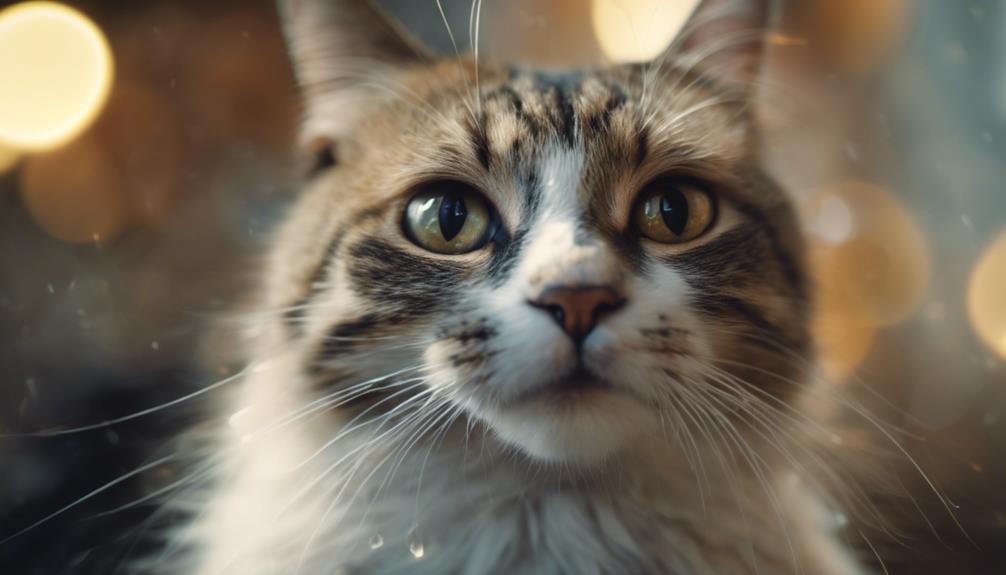
Ensuring adequate intake of fatty acids is crucial for maintaining optimal skin health in cats. Fatty acids play a significant role in nourishing and moisturizing the skin, helping to combat dryness and improve overall skin condition.
To support your cat's skin health, consider the following:
- Omega-3 and omega-6 fatty acids are essential for skin hydration and elasticity.
- Fatty acid supplements can be beneficial in promoting a healthy skin barrier.
- Diets rich in fat and protein help maintain skin health from the inside out.
Bathing Best Practices
To maintain your cat's skin health and prevent dryness, implementing proper bathing practices is essential. Cats generally do not require frequent baths, as excessive washing can strip their skin of natural oils.
When bathing your cat, opt for oatmeal-based shampoos specifically designed for dry skin conditions. It's crucial to use warm water, not hot, to avoid further drying out the skin.
If your cat's skin issues persist, consult with a veterinarian to determine if frequent bathing is necessary and to rule out any underlying medical conditions.
Identifying and Treating Underlying Conditions
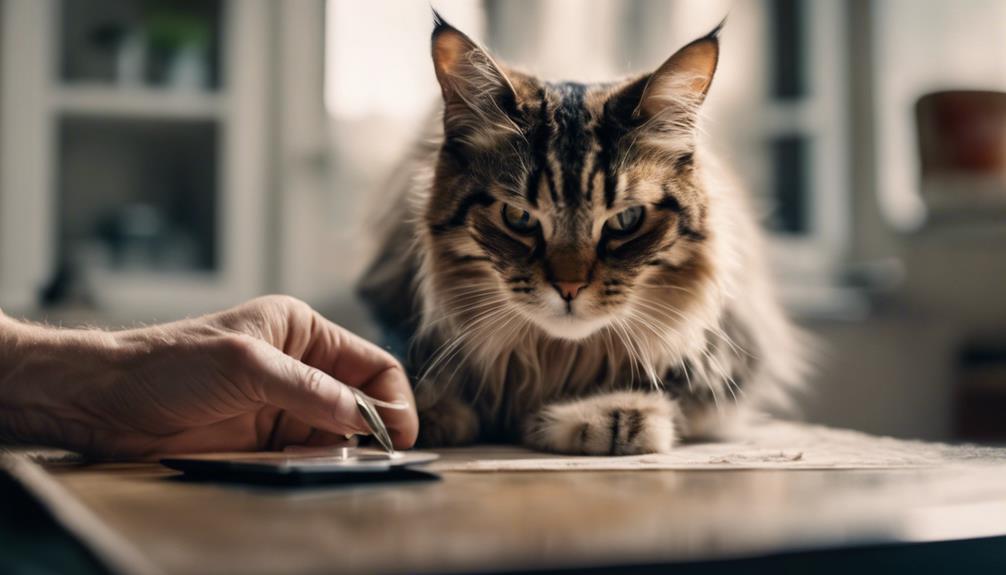
In veterinary practice, diagnosing and addressing underlying medical conditions is crucial when encountering cases of dry skin in cats. Identifying the root cause allows for targeted treatment, improving the cat's overall skin health and well-being. When faced with dry skin in cats, consider the following:
- Parasites: Fleas, mites, or lice infestations can lead to skin irritation.
- Allergies: Environmental or food allergies may manifest as dry, itchy skin.
- Infections: Bacterial or fungal skin infections can cause dryness and discomfort.
Consulting a veterinarian for a thorough examination and appropriate diagnostic tests is essential to determine the specific underlying condition and establish an effective treatment plan.
Frequently Asked Questions
How Can I Tell if My Cat's Dry Skin Is Caused by a Serious Underlying Condition?
To determine if your cat's dry skin stems from a serious underlying condition, monitor symptoms like itchiness, inflamed skin, hair loss, lethargy, weight loss, or increased drinking. Consult a veterinarian for accurate diagnosis and tailored treatment.
Are There Any Home Remedies That Can Help Alleviate My Cat's Dry Skin?
Home remedies like humidifiers, omega-3 supplements, proper grooming, and oatmeal baths can help alleviate your cat's dry skin. However, if symptoms persist or worsen, consult a veterinarian to identify and address underlying health issues.
Can Stress or Anxiety Contribute to Dry Skin in Cats?
Stress or anxiety can contribute to dry skin in cats. Psychological factors can impact skin health. Addressing the root cause of stress through environmental enrichment, routine, and calming techniques may help alleviate dry skin. Veterinary consultation is crucial for proper assessment and treatment.
Is There a Link Between Environmental Allergies and Dry Skin in Cats?
Environmental allergies can trigger dry skin in cats. Allergens like pollen, dust, or mold can lead to skin irritation. Identifying and addressing these allergies through vet consultation, environmental modifications, and possibly medication can help alleviate dry skin issues in cats.
Are There Any Specific Breeds of Cats That Are More Prone to Dry Skin Issues?
Certain cat breeds, like Sphynx, Cornish Rex, and Devon Rex, are predisposed to dry skin due to their unique coat characteristics. Regular grooming, proper nutrition, and skin moisturizing routines tailored to these breeds can help alleviate dry skin issues.
Conclusion
In conclusion, addressing the underlying causes of dry skin in cats through proper grooming, nutrition, and bathing practices is essential for promoting healthy skin and coat.
By recognizing potential factors such as environmental conditions and medical issues, pet owners can take proactive steps to alleviate dry skin symptoms in their feline companions.
Implementing home remedies such as fatty acids and balanced diets can help improve the overall well-being of cats and enhance their quality of life.




